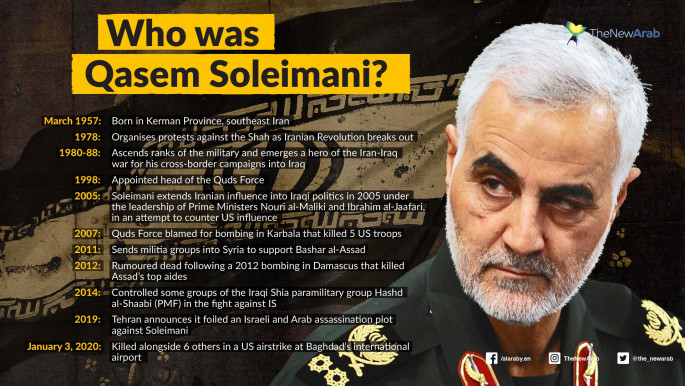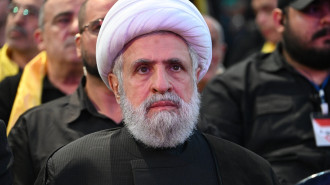Syria Weekly: Rattled Russia sparks Putin visit to Damascus
Syria Weekly: Rattled Russia sparks Putin visit to Damascus
Putin's visit to Damascus this week follows tensions between ally Iran and rival the US in Iraq and Syria.
6 min read
On Tuesday, Putin made his second visit to Damascus during the war [AFP]
Surprise is a word that has been affixed to Russian President Vladimir Putin's two visits to Syria during the war, where Moscow has been a key player.
Both tours have also been interpreted as a display of Moscow's key role in Syria, but also a statement to rival the US to keep out.
On Tuesday, Putin made his second visit to Damascus during the war, an event which coincided with important geopolitical events concerning Moscow's ally in the Syria war, Iran, and its rival in the region, the US.
Putin's previous unannounced visit to Russia's airbase in Latakia in 2017 was also viewed as a triumphant display of Moscow's confidence and the key role it now played in Syria, following the fall of opposition East Aleppo to the regime.
Putin's message that the Islamic State group (IS) had been defeated, and so Russian troops would soon return home, appeared directed at the US, which was making another foothold in Syria via the Syrian Democratic Forces (SDF) in their fight against Abu Bakr Al-Baghdadi's forces.
US rivalry
The defeat of IS didn't happen until two years later, by which time the US had established a series of bases across northern Syria, until President Donald Trump ordered American troops out of the country, something which is yet to happen.
Twitter Post
|
The subsequent siege of the American embassy in Baghdad by Tehran-linked militias and killing of Iranian Quds Force commander Qasem Soleimani by the US made it appear the two sides were heading to war. Syria, where Iran has stationed thousands of troops and allied militia fighters, would likely have been a theatre of conflict if war broke out between the two sides.
So far, such a scenario has been avoided but Russia likely felt rattled by the increasingly bellicose language of Trump and the threat this posed to Iranian militias in Syria, which have been the backbone of the regime's ground forces.
"Russia is now a major force in Syria, in terms of direct control over Assad, but I think this is somewhat complicated by the role Iran plays on the ground. So far, Iran and Russia are mostly in sync, so there’s no problem yet," Sam Hamad, an Egyptian-Scottish writer told The New Arab.
"There's no doubt that Putin turning up in Syria now is a message that Russia is a primary mover in the region at present, at least in Syria."
Trump has largely followed Obama's policy of keeping out of the Middle East's wars. The defeat of IS saw Trump take a step further and demand the immediate withdrawal of American troops from Syria.
Where Trump differs most from Obama is his administration is vehemently more suspicious of Iran and his withdrawal from the Iran nuclear deal put Washington on course for a series of confrontations with Tehran.
Soleimani killing
The limited response by Iran to the killing of Soleimani is likely an acknowledgement that the network of Iranian militias and bases he set up in Syria would be at serious risk in a war with the US.
With Russia dominating the skies in Syria, a major campaign against the Iranian proxies could threaten the gains Assad's side have made over the rebels over the past four years and so something Moscow would want to avoid.
"Putin's visit is a signal to the US, in case they were getting any ideas about Syria, that areas under the Assad regime's control is also Russia's territory, so the US should keep to its own sphere of influence."
Bachar Al-Halabi, Middle East researcher at the American University of Beirut, agreed that the visit likely reflects the important regional developments involving Iran and the US.
"For [Assad], Soleimani's killing could definitely be a de-stabalising factor for Syria specifically, which is why it was important for Putin to show up in Damascus to reaffirm Russian support for the regime," Halabi told The New Arab.
"The timing was designed to send a message to the world is that Russia is a forceful and reliable ally. With Soleimani now gone, Russian influence is projected to grow even more in Syria and it's in Moscow's interest to try and prevent an American-Iranian showdown in the region."
During the visit, Putin visited the Mariamite Cathedral and Umayyad Mosque in Damascus, which coincided with Orthodox Christmas on 7 January. This reflected the historic role Russia carved out as a "protector" of the region's Orthodox Christians, which Moscow has again tried to promote during its intervention in the Syria war, Halabi said.
"With Putin driving around Damascus, he wanted to market the results of his 'version of peace restoration' in Syria, where Christians are able to celebrate Christmas in their churches thanks to him," Halabi added.
"This message bodes well or resonates with Christians in the region who seem to view Putin as a 'protector of minorities' in the region."
Russia also announced its largest ever investment in Syria, with $500 million pledged for Tartus port, where Moscow also has a naval base. It underlines Moscow's economic, as well as military, role in Syria, a desire to see rewards for its intervention in the future.
Twitter Post
|
Putin's stopover in Damascus preceded his visit to Turkey to meet President Recep Tayyip Erdogan, as they celebrated the joint TurkStream gas pipeline.
The pipeline, which has been opposed by the US, is viewed as another example of the deeper strategic - as well as economic - cooperation between the two countries, which has grown over the years, despite Ankara's support for Syrian rebel groups.
Moscow's announcement of a ceasefire in Idlib - which has been subject to a horrendous bombardment by Russian aircraft - after Putin's visit, could well have been influenced by Turkey's desire to see a pause in the bloodshed, Halabi said.
"Turkey has been pushing for a ceasefire, in part because it is under enormous strain from the influx of Syrian refugees within its border. The agreement will not only stem the flow of refugees but also allow for much-needed aid by humanitarian organisations to reach people inside Syria," Halabi said.
An agreement at the UN of deliveries of aid to opposition areas in Syria was also reached on Friday night, something Moscow had previously held up, another sign of possible Turkish pressure on its Russian ally.
Previous ceasefires announced by Russia have not lasted long, but with a punishing winter heading in and hundreds of thousands more homeless in Idlib, it is hoped it will provide NGOs with the window they need to prevent another humanitarian crisis unfolding in Idlib.
Syria Weekly is a regular feature from The New Arab. To get Syria Weekly in your inbox each week, sign up here.
Paul McLoughlin is a news editor at The New Arab.
Follow him on Twitter: @PaullMcLoughlin


![Palestinians mourned the victims of an Israeli strike on Deir al-Balah [Getty]](/sites/default/files/styles/image_684x385/public/2024-11/GettyImages-2182362043.jpg?h=199d8c1f&itok=xSHZFbmc)


![The law could be enforced against teachers without prior notice [Getty]](/sites/default/files/styles/image_684x385/public/2178740715.jpeg?h=a5f2f23a&itok=hnqrCS4x)
 Follow the Middle East's top stories in English at The New Arab on Google News
Follow the Middle East's top stories in English at The New Arab on Google News


